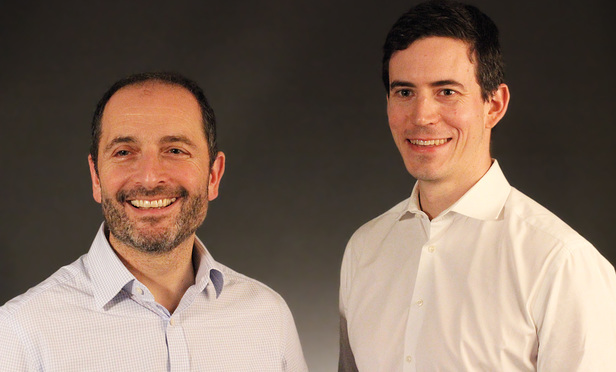Slaughters to offer free legal services to fintech innovators chosen by big-name panel
Autonomy founder and Santander innovation chief to help identify UK startups meriting magic circle support
October 31, 2016 at 06:15 AM
4 minute read
 Slaughters partners Rob Sumroy and Ben Kingsley
Slaughters partners Rob Sumroy and Ben Kingsley
Slaughter and May is set to offer free legal advice to up-and-coming UK tech entrepreneurs selected by a panel of experts including Autonomy co-founder Mike Lynch, as the magic circle firm looks to tap into the burgeoning startup market.
The firm is expecting to identify around 10 UK-based tech startups per year, with each successful candidate receiving £30,000 in free services including legal advice, access to model legal documentation and tailored coaching in areas such as pitching and presentations.
The companies will be selected by a panel led by Slaughters head of technology and outsourcing Rob Sumroy and financial services partner Ben Kingsley, alongside Lynch, Santander UK head of innovation Sigga Sigurdardottir, Trevor Callaghan, the GC of UK artificial intelligence company DeepMind Technologies, and Ophelia Brown, a partner at seed-focused venture capital fund LocalGlobe.
The first round of applications for the scheme, dubbed 'Fintech Fast Forward', will open on 17 November. Slaughters is aiming to complete this by January next year, with a view to launching the programme shortly after.
The firm is looking to work with companies operating in financial technology and similar fields, with a particular focus on businesses with the potential to deliver "meaningful improvements or increased competition". The firm is open to discussions about ways to continue to support the companies when they reach the £30,000 mark, and will consider refreshing the programme twice a year.
The news comes after Slaughters announced last month it had adopted new artificial intelligence technology – Luminance Technologies – funded by Lynch's tech investment firm, Invoke Capital.
"We will consider applications throughout the year. In terms of formal application rounds we will probably hold a couple within the year," said Sumroy, who is spearheading the programme alongisde Kingsley.
The pair are also joint heads of Slaughters' fintech group, which launched two years ago and now includes 13 partners.
Sumroy continued: "We think we can give a lot to the entrepreneur community at an early stage of growth. Of course we have many big, established clients doing great stuff in fintech but we also want to make sure interesting startup companies can access us going forward."
Kingsley added: "Our forte is complex financial services and regulatory issues. There are plenty of small and mid-sized firms doing great work in the startup community – but they can have problems when their clients say: 'Thanks for getting the corporate structure set up; now we need to engage with a regulator on something they've never seen before.' That's where we can add more value."
Slaughters has worked with startups in the past, albeit in a more informal way. For example, it advised UK chip designer Cambridge Silicon Radio (CSR) when it launched nearly two decades ago.
"CSR was originally launched by a team of Cambridge-educated tech people. We first knew them because our clients had invested in them. They were looking for support. They wouldn't have traditionally gone to a large firm but some of the things they were doing were complex.
"We felt we didn't need to charge CSR for everything we did in the early days, because we knew there would be fee-earning opportunities further down the line and they became a great client for us."
Slaughters' investment in CSR paid off in 2014, when it advised on the company's $2.4bn (£2m) sale to US chipmaker Qualcomm.
Kingsley said: "If we look at some of our most successful clients, we can trace back the relationship to a point in time where we took a bit of a risk in doing either free or low paying work. So we are turning an ethos we have had for some time into a programme."
Other firms that run similar programmes include Simmons & Simmons, which launched a £100,000 fintech fund in May this year. Earlier this month, it announced its first fund recipients, including Alterest, which brings transparency to non-bank credit markets, and Cuvva, which provides hourly car insurance on demand.
This content has been archived. It is available through our partners, LexisNexis® and Bloomberg Law.
To view this content, please continue to their sites.
Not a Lexis Subscriber?
Subscribe Now
Not a Bloomberg Law Subscriber?
Subscribe Now
NOT FOR REPRINT
© 2025 ALM Global, LLC, All Rights Reserved. Request academic re-use from www.copyright.com. All other uses, submit a request to [email protected]. For more information visit Asset & Logo Licensing.
You Might Like
View All

Workload and Getting It All Done Top Challenges for In-house Counsel: Survey
4 minute read
Amazon Corporate Counsel in Brussels Returns to US Firm in ‘Boomerang Hire’
2 minute read
Former Miral GC Brings Commercial Insight to BCLP’s Middle East Real Estate Practice
4 minute readTrending Stories
- 1Uber Files RICO Suit Against Plaintiff-Side Firms Alleging Fraudulent Injury Claims
- 2The Law Firm Disrupted: Scrutinizing the Elephant More Than the Mouse
- 3Inherent Diminished Value Damages Unavailable to 3rd-Party Claimants, Court Says
- 4Pa. Defense Firm Sued by Client Over Ex-Eagles Player's $43.5M Med Mal Win
- 5Losses Mount at Morris Manning, but Departing Ex-Chair Stays Bullish About His Old Firm's Future
Who Got The Work
J. Brugh Lower of Gibbons has entered an appearance for industrial equipment supplier Devco Corporation in a pending trademark infringement lawsuit. The suit, accusing the defendant of selling knock-off Graco products, was filed Dec. 18 in New Jersey District Court by Rivkin Radler on behalf of Graco Inc. and Graco Minnesota. The case, assigned to U.S. District Judge Zahid N. Quraishi, is 3:24-cv-11294, Graco Inc. et al v. Devco Corporation.
Who Got The Work
Rebecca Maller-Stein and Kent A. Yalowitz of Arnold & Porter Kaye Scholer have entered their appearances for Hanaco Venture Capital and its executives, Lior Prosor and David Frankel, in a pending securities lawsuit. The action, filed on Dec. 24 in New York Southern District Court by Zell, Aron & Co. on behalf of Goldeneye Advisors, accuses the defendants of negligently and fraudulently managing the plaintiff's $1 million investment. The case, assigned to U.S. District Judge Vernon S. Broderick, is 1:24-cv-09918, Goldeneye Advisors, LLC v. Hanaco Venture Capital, Ltd. et al.
Who Got The Work
Attorneys from A&O Shearman has stepped in as defense counsel for Toronto-Dominion Bank and other defendants in a pending securities class action. The suit, filed Dec. 11 in New York Southern District Court by Bleichmar Fonti & Auld, accuses the defendants of concealing the bank's 'pervasive' deficiencies in regards to its compliance with the Bank Secrecy Act and the quality of its anti-money laundering controls. The case, assigned to U.S. District Judge Arun Subramanian, is 1:24-cv-09445, Gonzalez v. The Toronto-Dominion Bank et al.
Who Got The Work
Crown Castle International, a Pennsylvania company providing shared communications infrastructure, has turned to Luke D. Wolf of Gordon Rees Scully Mansukhani to fend off a pending breach-of-contract lawsuit. The court action, filed Nov. 25 in Michigan Eastern District Court by Hooper Hathaway PC on behalf of The Town Residences LLC, accuses Crown Castle of failing to transfer approximately $30,000 in utility payments from T-Mobile in breach of a roof-top lease and assignment agreement. The case, assigned to U.S. District Judge Susan K. Declercq, is 2:24-cv-13131, The Town Residences LLC v. T-Mobile US, Inc. et al.
Who Got The Work
Wilfred P. Coronato and Daniel M. Schwartz of McCarter & English have stepped in as defense counsel to Electrolux Home Products Inc. in a pending product liability lawsuit. The court action, filed Nov. 26 in New York Eastern District Court by Poulos Lopiccolo PC and Nagel Rice LLP on behalf of David Stern, alleges that the defendant's refrigerators’ drawers and shelving repeatedly break and fall apart within months after purchase. The case, assigned to U.S. District Judge Joan M. Azrack, is 2:24-cv-08204, Stern v. Electrolux Home Products, Inc.
Featured Firms
Law Offices of Gary Martin Hays & Associates, P.C.
(470) 294-1674
Law Offices of Mark E. Salomone
(857) 444-6468
Smith & Hassler
(713) 739-1250








